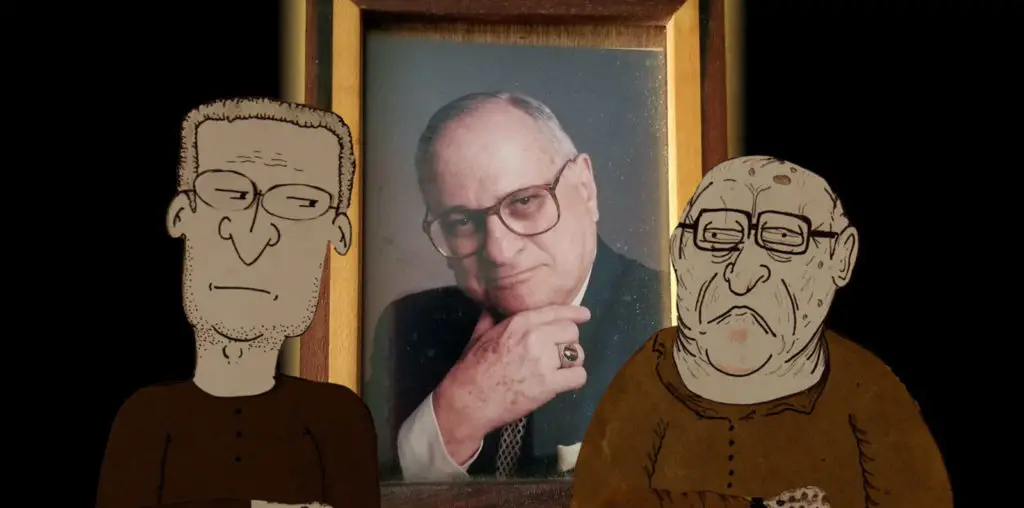
“The human voice is the organ of the soul.” – Henry Wadsworth Longfellow
In deference to my own interpretation of how Kurt Cobain defined himself, I’d like to point out what this film is not. This film is not a typical rockumentary full of celebrity and friendly talking heads, archival concert footage or anecdotes and pictures from Kurt’s past. What this is, simply, is Kurt Cobain’s voice, carrying on an extended conversation.
In the early 90’s, Kurt Cobain and his band Nirvana re-defined rock music as we know it. Elevated to a God-like status, Kurt’s life in the limelight was one of constant scrutiny, whether it be over his marriage with Courtney Love or his constant battles with drug addiction. Unfortunately for those who loved him, and in a grander sense the music world, Kurt’s time at the top was cut short by his tragic suicide, and it seemed all that we would ever know of Kurt Cobain was what existed in the songs he wrote, the interviews he gave and the concerts he performed in.
That is until recently, when writer Michael Azerrad re-visited audio recordings he had made of conversations he and Kurt had over the course of late 1992 / early 1993. The audio conversations, originally the basis of Azerrad’s book about Nirvana, “Come As You Are: The Story of Nirvana,” were frank and multi-dimensional, revealing a more complete picture of the icon that was Kurt Cobain than had ever been heard before. With the collaboration of filmmaker AJ Schnack (“Gigantic: A Tale of Two Johns”), Azerrad allowed the audio to be re-cut and re-purposed to build the framework for a new documentary about Kurt Cobain told entirely in Kurt’s own words. That documentary became “Kurt Cobain About a Son.”
What strikes you right out of the gate with this film is the voice of Kurt Cobain. It is not the sound we recognize from interviews, MTV or concerts, but the way he actually sounded were he to have a normal conversation with you. You wouldn’t think there’d be a huge difference, because weren’t we all too familiar with Kurt Cobain and Nirvana in the early 90’s, but there is a difference. So staggering, in fact, that it achieves its intended effect, which is to begin to build a fresh picture.
As the conversation flows and the re-building of the personage of Kurt Cobain continues through his own words, the film eschews normal convention by showing imagery from Kurt’s life through newly filmed footage as opposed to stock photos or archival pictures (in fact, images of Kurt don’t appear until the end of the film). As Kurt talks about his early days in Aberdeen, we see the town as it is today, and the inhabitants as they currently exist. What this achieves is an almost subliminal effect, as the power of the film exists in Kurt’s words, but we have the images to illustrate his words in front of us, in almost blank canvas form for us to interpret as we see fit. This also gives a first-person perspective, making you the listener more of an active participant. Instead of hearing and seeing a man on a journey, you find yourself embarking upon and re-living it with him.
And all the while this perfect storm of documentary innovation is enhanced by two distinct musical avenues. On the one side we have a soundtrack comprised of songs from Kurt’s favorite bands, bands that he routinely name-dropped while talking about his influences. As Kurt re-forms, we get to experience the music that built his unique artistic voice. On the other side is a complementary score co-composed by Pacific Northwest heavyweights Steve Fisk (best known for his producing days with Sub Pop) and Benjamin Gibbard (Death Cab for Cutie, Postal Service). While the soundtrack helps you see where Kurt is coming from, the score ties it all together, connecting Kurt’s words, the imagery and the soundtrack into an ever-flowing sensory experience.
In the end, we have a documentary that re-imagines the form as much as it allows Kurt’s own voice to re-define your perception of him. Everyone involved with the film brings their top talents to the fore, and the result is a touching, heartbreaking and an ultimately honest personal experience. But when all is said and done, all that is really there is the complexity of Kurt Cobain, explained as only the man himself could. If I have any criticism of the film (and the game of life), it’s that I wish Kurt could’ve been allowed to say even more.
Read Film Threat’s exclusive interview with Michael Azerrad, AJ Schnack and Steve Fisk in “Michael, AJ and Steve: About a Doc”>>>

